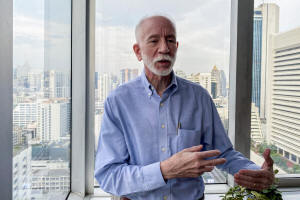Far-flung U.S. citizens clamour for vaccines from embassies
 Send a link to a friend
Send a link to a friend
 [May 12, 2021]
By Kay Johnson and Jiraporn Kuhakan [May 12, 2021]
By Kay Johnson and Jiraporn Kuhakan
BANGKOK (Reuters) - Americans living abroad
are asking Washington to send surplus coronavirus shots to overseas
embassies so they can get a vaccine in countries where the pace of
inoculations is slow and travelling home is difficult.
Many of the estimated 8 million Americans living abroad argue they
should have the same right to a vaccine as U.S. citizens back home. The
U.S. vaccination drive covers all of the population and surplus doses
are earmarked for donation to India and other nations.
"Vaccines could be provided to U.S. citizens through U.S. embassies and
consulates, in particular as many are now re-opening for U.S. citizen
services," said Marylouise Serrato, executive director of the advocacy
group American Citizens Abroad.
The group last month wrote to the U.S. Congress and the State Department
saying overseas Americans who file taxes and vote should have the same
access to vaccines as U.S. residents.

White House press secretary Jen Psaki said this week the U.S. government
is focused on the safety of Americans around the world but is not now
prepared to provide vaccines.
"We have not historically provided private healthcare for Americans
living overseas, so that remains our policy," Psaki told reporters. "But
I don't have anything to predict in terms of what may be ahead."
Many Americans overseas are travelling home if they can to be vaccinated
or waiting for the inoculation campaign in their countries of residence.
But those living in places where vaccine rollouts are slower or where
travel is difficult say they feel stuck.
In Thailand, four U.S. citizens' groups on May 6 wrote to U.S. Secretary
of State Antony Blinken asking for the Southeast Asian country to be
made a pilot project for global vaccination of Americans abroad.
Thailand is in the midst of a deadly third wave of coronavirus, after a
year of successfully containment, and its mass vaccination drive doesn't
begin until next month.
"JUST FORGOTTEN"
The U.S. State Department last month said it had already shipped doses
to embassies and consulates in 220 locations worldwide to vaccinate its
own diplomats and other employees.
The diplomatic distribution shows that the U.S. government has the
capacity to do the same for citizens, said local chapters of the
Democrats Abroad, Republicans Overseas, the Veterans of Foreign Wars and
the American Women's Club in Thailand.
[to top of second column]
|

Peter Fischbach, a U.S. citizen member of Democrats Abroad, poses
during an interview with Reuters in Bangkok, Thailand May 11, 2021.
REUTERS/Jiraporn Kuhakan

"We are tax-paying, voting U.S. citizens and we were
promised that we would be eligible to be vaccinated by our
government, and here we are being just forgotten," said business
owner Peter Fischbach, in Thailand for nearly 30 years.
He worries it may be weeks or months before he can get a shot in
Thailand. His business obligations - plus Thailand's strict two-week
quarantine for people entering the country - make it unfeasible to
return to the United States.
The U.S. Embassy in Bangkok declined to comment. There are no
official figures on Americans living in Thailand, but Democrats
Abroad estimates it as tens of thousands.
Financial tech worker Aaron Kruse, 32, was working in China along
with his South African fiancee when the pandemic struck. The couple
travelled to Cape Town, South Africa, where travel restrictions and
then the South African variant of the virus have now derailed their
plans.
"So now we're very much stuck," said Kruse, who is from Des Moines,
Iowa.
South African's American expatriate community has not made a formal
request, as in Thailand, but even without such a request Kruse says
he thinks U.S. embassies should provide vaccines to Americans in
need.
But he also supports donating shots to needy countries and is keenly
aware that should the U.S. bring in vaccines for its own citizens -
this would be criticised.

"I do kind of see it as special treatment," he said.
"But at the same time, if the United States is looking out for U.S.
citizens, and we have a surplus of vaccines, then the next place to
look for U.S. citizens must be where they live and reside overseas."
(Additional reporting by Joe Bavier in Johannesburg. Writing by Kay
Johnson; Editing by Alexandra Hudson)
[© 2021 Thomson Reuters. All rights
reserved.] Copyright 2021 Reuters. All rights reserved. This material may not be published,
broadcast, rewritten or redistributed.
Thompson Reuters is solely responsible for this content. |